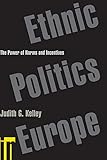Ethnic Politics in Europe : The Power of Norms and Incentives / Judith G. Kelley.
Material type: TextPublisher: Princeton, NJ : Princeton University Press, [2010]Copyright date: ©2004Edition: Course BookDescription: 1 online resource (288 p.) : 4 line illus. 25 tablesContent type:
TextPublisher: Princeton, NJ : Princeton University Press, [2010]Copyright date: ©2004Edition: Course BookDescription: 1 online resource (288 p.) : 4 line illus. 25 tablesContent type: - 9780691127712
- 9781400835652
- 323.147
- JN96.A58
- online - DeGruyter
- Issued also in print.
| Item type | Current library | Call number | URL | Status | Notes | Barcode | |
|---|---|---|---|---|---|---|---|
 eBook
eBook
|
Biblioteca "Angelicum" Pont. Univ. S.Tommaso d'Aquino Nuvola online | online - DeGruyter (Browse shelf(Opens below)) | Online access | Not for loan (Accesso limitato) | Accesso per gli utenti autorizzati / Access for authorized users | (dgr)9781400835652 |
Frontmatter -- Contents -- Figures and Tables -- Preface -- Introduction -- Part I. Theory and Data -- Part II. Case Studies -- Part III. Evaluation -- Appendix -- Notes -- References -- Index
restricted access online access with authorization star
http://purl.org/coar/access_right/c_16ec
This detailed account of ethnic minority politics explains when and how European institutions successfully used norms and incentives to shape domestic policy toward ethnic minorities and why those measures sometimes failed. Going beyond traditional analyses, Kelley examines the pivotal engagement by the European Union, the Organization for Security and Cooperation in Europe, and the Council for Europe in the creation of such policies. Following language, education, and citizenship issues during the 1990s in Latvia, Estonia, Slovakia, and Romania, she shows how the combination of membership conditionality and norm-based diplomacy was surprisingly effective at overcoming even significant domestic opposition. However, she also finds that diplomacy alone, without the offer of membership, was ineffective unless domestic opposition to the proposed policies was quite limited. As one of the first systematic analyses of political rather than economic conditionality, the book illustrates under what conditions and through what mechanisms institutions influenced domestic policy in the decade, preparing the way for the historic enlargement of the European Union. This thoughtful and thorough discussion, based on case studies, quantitative analysis, and interviews with nearly one hundred policymakers and experts, tells an important story about how European organizations helped facilitate peaceful solutions to ethnic tensions--in sharp contrast to the ethnic bloodshed that occurred in the former Yugoslavia during this time. This book's simultaneous assessment of soft diplomacy and stricter conditionality advances a long overdue dialogue between proponents rational choice models and social constructivists. As political requirements increasingly become part of conditionality, it also provides keen policy insights for the strategic choices made by actors in international institutions.
Issued also in print.
Mode of access: Internet via World Wide Web.
In English.
Description based on online resource; title from PDF title page (publisher's Web site, viewed 30. Aug 2021)


